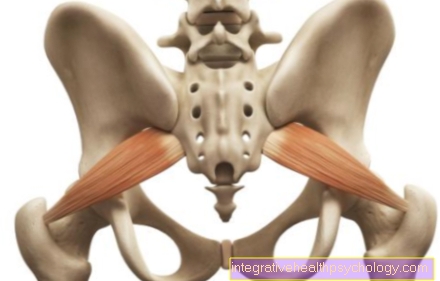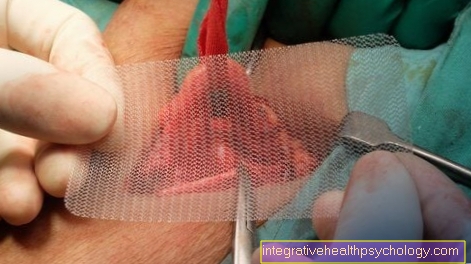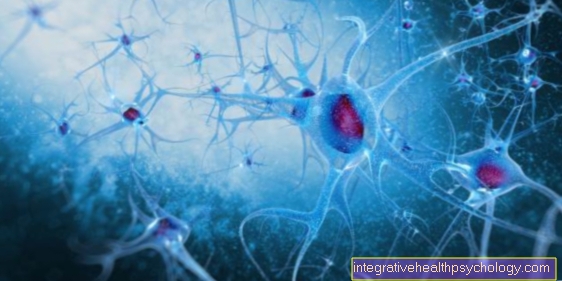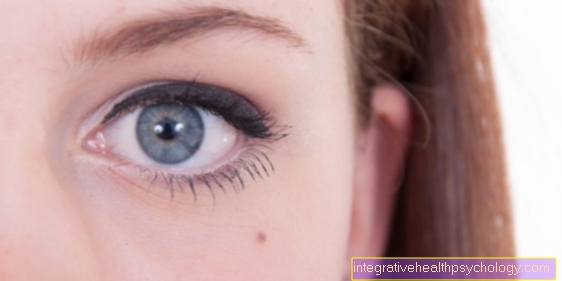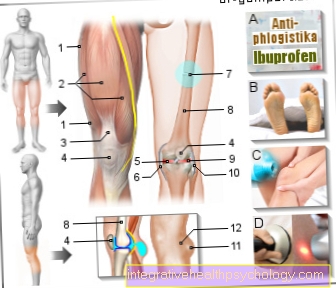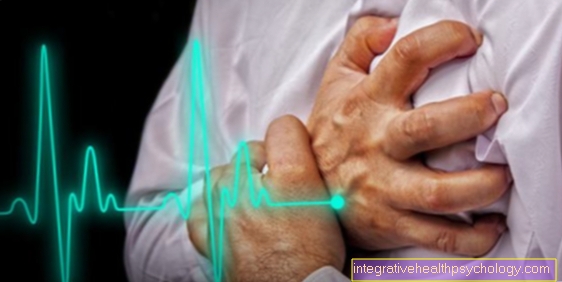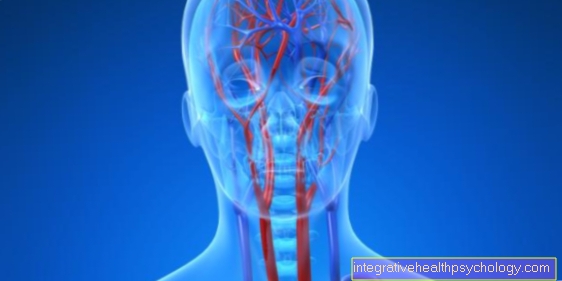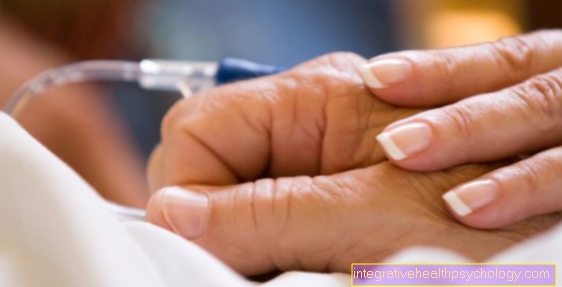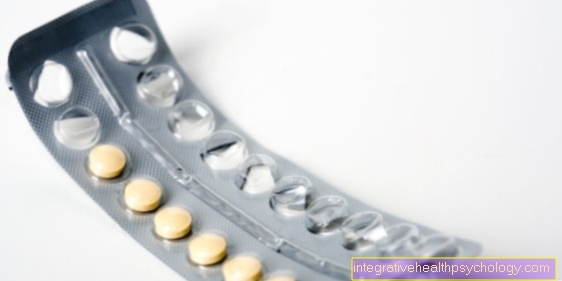Adrenogenital Syndrome
definition
The adrenogenital syndrome is a hereditary disease caused by a genetic defect. There are different forms of progression. Depending on the course of the disease, the symptoms already exist from birth or do not set in until puberty. The enzyme defect leads to a deficiency of certain hormones on the one hand and an excess of androgens, the male sex hormones, on the other. Therapy consists in lifelong substitution of the missing hormones.
In our article you can read what is meant by metabolic disorders in the general sense: Metabolic Disorder - What does it mean?

causes
The cause of the adrenogenital syndrome is a genetic defect. This genetic defect means that a certain enzyme is not present. Depending on the genetic defect, different enzymes can be affected, but the symptoms are similar. The affected enzymes do their work in healthy people Adrenal cortex. There three hormones / hormone groups are produced. Cortisol, aldosterone and the male sex hormones, the androgens. These hormones all arise from precursors. The formation of the hormones from these precursors is done by enzymes that split off certain parts from the precursors until the end product is created.
The adrenogenital syndrome now has a Deficiency of one of the enzymes so that the end stages of the hormones can no longer be produced. So there is one Lack of cortisol and / or aldosterone. Due to the deficiency, the central nervous system believes it needs to stimulate the adrenal cortex more in order for it to produce enough of the hormones. But it cannot do that due to the lack of enzymes. Only the male sex hormones continue to be produced in sufficient numbers.
Since the adrenal cortex is stimulated again and again due to the lack of the other hormones, will produces way too many androgens. In addition, the hormone precursors for cortisol and aldosterone, which cannot be further converted into these hormones due to the lack of enzyme, are also converted into androgens in another way. The result is a significant excess of male sex hormones. Most commonly, an enzyme called 21-hydroxylase is defective.
Concomitant symptoms
One distinguishes the classic and the non-classic course form of adrenogenital syndrome. The symptoms also differ depending on the course of the disease. These also depend on the sex of the person concerned.
A classic adrenogenital syndrome that in one girl is noticeable immediately after birth. The girl's genitals are clearly masculine, one speaks of one Virilization or androgenization. This can extend to the formation of a so-called pseudopenis. The internal sexual organs (uterus, ovaries, etc.), on the other hand, are normal.
At newborn boy the adrenogenital syndrome is not noticeable at first. In the course of the disease, both girls and boys with the classic adrenogenital syndrome initially show a clear accelerated body growth. In the course, however, the growth ends prematurely so that it becomes one if left untreated Short stature comes. During puberty, more pubic hair grows in girls, it shows up overall male hair pattern among other things with chest hair. This is called hirsutism.
Some women have no menstrual period. Male patients show significant growth of the genitals at an early stage, but testicles remain small. Male patients with adrenogenital syndrome are unable to conceive.
In about every second person affected, a so-called salt loss syndrome occurs in addition to the symptoms mentioned above. This is due to the lack of the hormone aldosterone. In the first few days of life, the infants affected develop severe salt balance disorders with vomiting and weight loss. Salt loss syndrome is potentially life threatening.
The non-classical adrenogenital syndrome shows up much later than the classical form. Symptoms - if at all - do not appear until puberty and are usually milder than in the classic form. Girls may have increased hair, a deep voice, acne, and menstrual irregularities, among other things.
Androgenital syndrome is an example of a congenital disease associated with overactive adrenal glands. The overactive adrenal glands have serious consequences for the body. Find out more about this topic at: What are the consequences of an overactive adrenal gland?
high blood pressure
In the case of a certain enzyme defect that is one of the rarer ones, the adrenogenital syndrome can also be associated with high blood pressure. This should be easy to adjust with adequate therapy, otherwise additional drug-based blood pressure therapy is necessary.
diagnosis
A specialist in metabolic disorders specializes in endocrinologist calls that endocrinology is a field of internal medicine. The endocrinologist makes a suspected diagnosis based on the symptoms described and can then by means of a special blood test make the diagnosis. In this examination, a certain hormone precursor can be detected in a significantly increased concentration.
Inheritance
The adrenogenital syndrome is a so-called hereditary disease. This means that it can be passed on from those affected to their descendants. The disease will inherited as an autosomal recessive trait. For example, if one parent has adrenogenital syndrome and the other partner has one of two copies of the defective gene, there is a 50% risk that the child will also suffer from adrenogenital syndrome.
therapy
Adrenogenital syndrome and its symptoms are generally good to treat, but the condition is not curable. Those affected need one Hormone replacement therapy. The hormone cortisol, which cannot be sufficiently produced due to the enzyme deficiency, must be taken in tablet form. Cortisol is also known as the stress hormone. This means that it increases significantly in stressful situations. However, since the hormone cannot be sufficiently produced in the body but is supplied in tablet form, care must be taken to increase the dose in potentially stressful situations. These include, for example, operations, infections and intense physical exertion.
Also occurs at the same time Salt loss syndrome on, the hormone must also Aldosterone taken in tablet form become. But in addition to the hormone replacement, the psychological stress caused by the masculinization of the female affected should not be underestimated. In patients who suffer from classic adrenogenital syndrome and who have already been born with masculinized genitals, can operative interventions in the sense of plastic surgery help. In order to avoid masculinization (hairiness, acne, deep voice), hormones can be taken that act as antagonists of the male sex hormones that are present in excess (antiandrogens).
Duration
The adrenogenital syndrome is a disease that cannot be cured. This means that while it can be treated with medication, it never goes away. The Accordingly, medication must be taken for life.
Desire to have children with adrenogenital syndrome
Adrenogenital syndrome is a hereditary disease. So there is a risk of passing the disease on to offspring. Patients who suffer from the disease and who want to have children should be present in a specialized office hour. However, it should also be remembered that women and men with adrenogenital syndrome are not uncommon barren could be.
Women with the non-classical form of the adrenogenital syndrome have a relatively good chance of becoming pregnant, but their fertility is often limited. In women with the classic form, there is often no possibility of pregnancy. In order to be able to discuss and diagnose this individually, however, a specialized medical center should be visited.




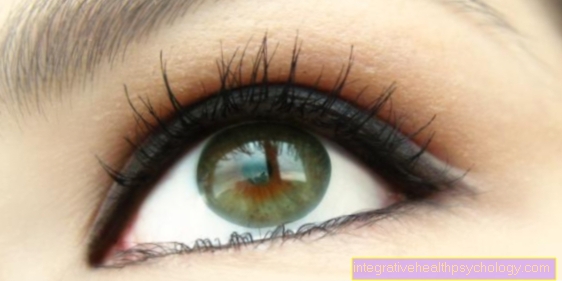
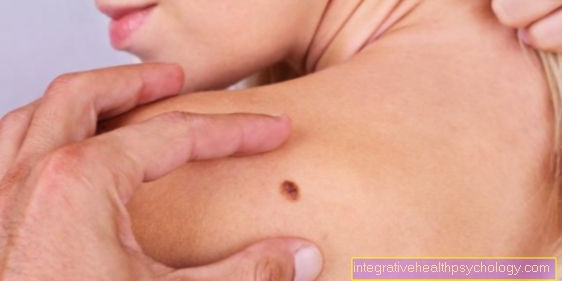
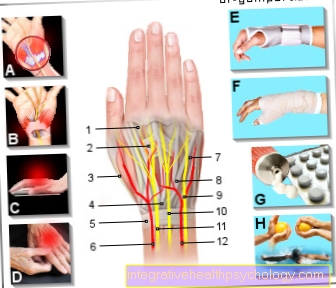
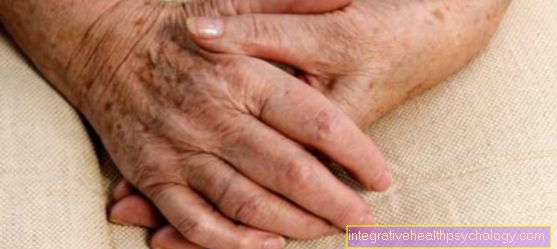


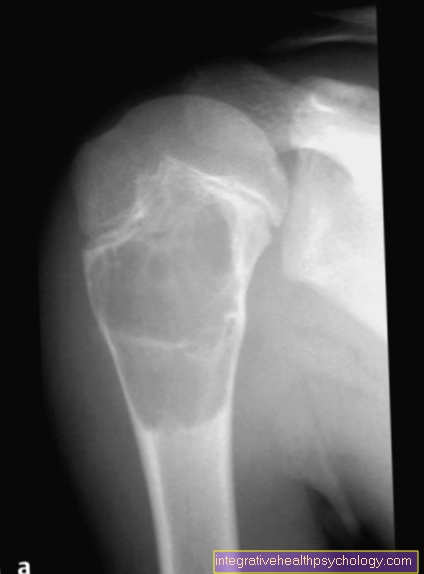
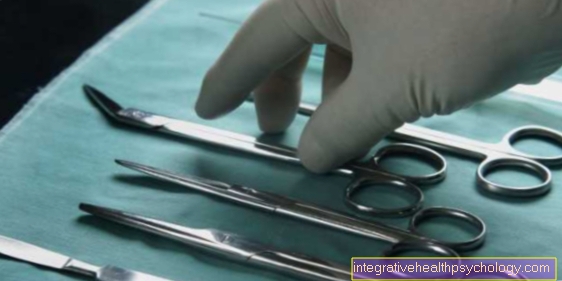
.jpg)
